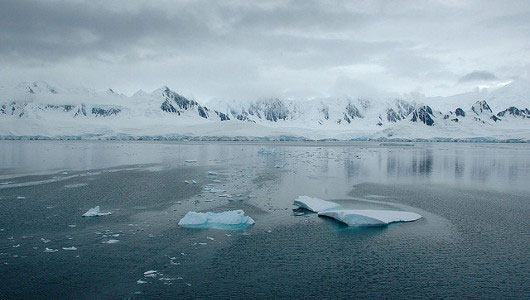Russia returned to the Polar Wind station
One of the missions on the Russian continent's ice continent was to restart the 'Russkaia' station (Russia). This facility was founded in 1973 and operated until the early 90s. So far, this is the only research station on the Pacific coast of Antarctica.
The "Russian" station is also called the planet's "extreme wind" , because here the average annual wind speed is highest - 13 meters / second. Scientists note that, for monsoon indicators, this site is unique on the planet, which is essential for meteorological observations.
This year, Russian Antarctic explorers will come to the facility to perform repairs and then restart the research station in the winter.
This facility maintains and maintains automatic observation devices as well as devices to transmit satellite information. The storms and strong winds damage the technical equipment, so participants in the expedition should do the repair work carefully. However, for the experts to stay there, it is necessary to upgrade the entire infrastructure of the "Ultra-wind" station . This facility is the only research station on the southern coast of several thousand kilometers long from the Antarctica peninsula to the Ross Sea.

Deputy head of the Russian Antarctic expedition of the Arctic and Antarctic Research Institute of Roshydromet (Russian Meteorological Agency) Vyacheslav Martianov said: 'This is the least studied area on the planet, even in the Southern Ocean. and Antarctica. This area is very interesting from the atmospheric circulation perspective and other scientific aspects. The Russian Space Agency 'Roscosmos' is also very interested in this area because it is sometimes heard that some spacecraft has sunk into the South Pacific waters. This is the area. This is also a very important area to monitor our satellites. When the "Russian" station is in operation, the lowest annual average atmospheric pressure in the world has been recorded. There are many interesting things for scientists and experts'.
In the work plan of Russia's Antarctic expedition, more than 40 programs must be done before the end of the expedition season.Icebreaker "Fedorov Institute" is present near the "Progress" research station to ensure the operation of the existing research facilities. Russia has resumed research work on the underground lake Vostok - an ancient underground lake deep beneath the ice in Antarctica. New water samples will be sent to Russia to analyze components and detect potential "residents" of the underground lake.
In 2012, Russian experts drilled wells to the water in the underground lake, which filled the hole and then froze. The first season, scientists once again drilled wells to the water in the underground lake, but this time using compensated pressure equipment, so that the pressure level in the lake and in the well is balanced. . This year, after the regular drilling session, the next stage of underground lake research with special equipment will begin.
- Russia's Soyuz spacecraft returned to Earth
- The research station is at the end of the world
- Russia announced the race to build the Moon space station
- 13 splendid train stations like the palace in Russia
- Three astronauts returned to Earth safely after nearly 6 months on ISS
- World's first floating wind power generation station
- The world's largest wind turbine goes into operation in the UK
- 3 astronauts on the International Space Station returned safely
- Russia relocated urgently the Arctic research station
- Russia plans to shorten the operational duration of the ISS station
- Russia launched ships carrying new year gifts to the ISS station
- NASA will bring ocean wind tracking device to ISS
 Norway built the world's tallest wooden tower
Norway built the world's tallest wooden tower Kremlin
Kremlin Ashurbanipal: The oldest royal library in the world
Ashurbanipal: The oldest royal library in the world Decoding the thousand-year construction of Qin Shihuang shocked the world
Decoding the thousand-year construction of Qin Shihuang shocked the world Why do women sleep less and wake up more than men?
Why do women sleep less and wake up more than men?  Binh Dinh wants to build a space research center
Binh Dinh wants to build a space research center  Inventions and research that could win the Nobel Prize this year
Inventions and research that could win the Nobel Prize this year  Smartphone fully charged in 1 minute: 'Trick' or unprecedented breakthrough?
Smartphone fully charged in 1 minute: 'Trick' or unprecedented breakthrough?  Interesting discovery: Bees 'shake hands' with each other to play with Lego
Interesting discovery: Bees 'shake hands' with each other to play with Lego  Artificial touch helps robots be as sensitive as humans
Artificial touch helps robots be as sensitive as humans 